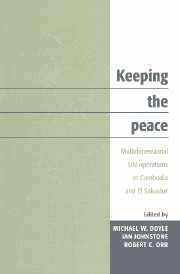Book contents
- Frontmatter
- Contents
- Preface
- Notes on the contributors
- List of abbreviations
- 1 Introduction
- Cambodia
- Map
- 2 Three visions of politics in Cambodia
- 3 The political dynamics of the peacemaking process in Cambodia
- 4 The Cambodian Settlement Agreements
- 5 Holding a fragile peace: the military and civilian components of UNTAC
- 6 Authority and elections in Cambodia
- 7 Returning home: the repatriation of Cambodian refugees
- 8 Quick impacts, slow rehabilitation in Cambodia
- El Salvador
- Conclusion and chronologies
- Select bibliography
- Index
8 - Quick impacts, slow rehabilitation in Cambodia
Published online by Cambridge University Press: 22 October 2009
- Frontmatter
- Contents
- Preface
- Notes on the contributors
- List of abbreviations
- 1 Introduction
- Cambodia
- Map
- 2 Three visions of politics in Cambodia
- 3 The political dynamics of the peacemaking process in Cambodia
- 4 The Cambodian Settlement Agreements
- 5 Holding a fragile peace: the military and civilian components of UNTAC
- 6 Authority and elections in Cambodia
- 7 Returning home: the repatriation of Cambodian refugees
- 8 Quick impacts, slow rehabilitation in Cambodia
- El Salvador
- Conclusion and chronologies
- Select bibliography
- Index
Summary
There will be no peace without development, and no development without peace.
Sergio Viera de Mello, UNHCR Special Envoy and Director of the UNTAC Repatriation ComponentIntroduction
Although the participants of the Paris peace conference considered rehabilitation important enough to include a separate Declaration on the Rehabilitation and Reconstruction of Cambodia as one of the three parts of the Paris Agreements, UNTAC itself did very little in terms of rehabilitation during the eighteen months it was in Cambodia. Like several other UNTAC components, the Rehabilitation Component was slow to become operational, lacked a clear mandate, suffered from staffing and leadership problems, and was given neither the resources nor authority to carry out its primary responsibility of aid coordination. Donor hesitancy to commit money to an unstable political situation and to a disliked government slowed and skewed the flow of aid, and the myth of four equal factions enshrined in the Paris Peace Agreement (when in fact one faction controlled and bore the responsibility for administering 75–80 percent of the country) allowed the other factions to block desperately needed public sector assistance for political reasons.
In fact, it can be argued that some aspects of the economy deteriorated further under UNTAC. Urban booms, generated in larger part by UNTAC spending, increased the rural–urban gap, promoted shallow “consumer” economic activity and corruption, and encouraged an influx of Vietnamese laborers and prostitutes, which exacerbated anti-Vietnamese tensions.
- Type
- Chapter
- Information
- Keeping the PeaceMultidimensional UN Operations in Cambodia and El Salvador, pp. 186 - 206Publisher: Cambridge University PressPrint publication year: 1997
- 2
- Cited by



